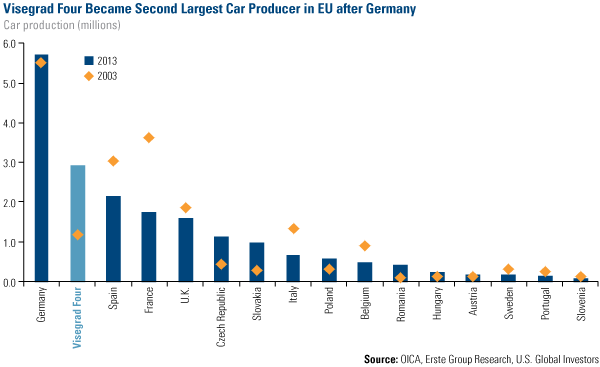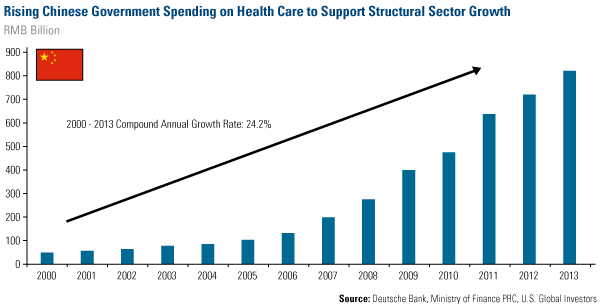Emerging Markets Radar (May 5, 2014)
Strengths
- European Union (EU) membership has expanded the export opportunities for Eastern European countries, with the highest contribution to export growth in these countries coming from exports to old member states. This unique opportunity allowed for companies in Western Europe to build new or scale up existing production capacities in the Eastern Europe EU member countries. Car manufacturing became the most prominent export oriented industry in the four Central European countries of Czech Republic, Hungary, Poland, and Slovakia, known as the Visegrad Four, or V4. These countries have been persistently outperforming car production in old member states and, as a group, have become the second largest car producer in EU, after Germany.
- Fitch Ratings changed the outlook on Slovenia’s credit rating to stable from negative, saying the economy is recovering faster than expected. According to Fitch, “the government’s policy actions in late 2013 and early 2014 have materially reduced risks surrounding the banking sector, and thus the sovereign balance sheet.” The government actions over the past 12 months helped the Adriatic nation avoid a bailout last year by repairing the banking industry, initiating the sale of state-owned companies and pledging to reduce a budget gap that ballooned to 15 percent of output.
- Indonesia’s trade balance remained in surplus for a second straight month in March at $673 million, higher than consensus estimates. Headline inflation continued to moderate to 7.25 percent year-over-year in April, thanks to easing food inflation.
Weaknesses
- Brazilian President Dilma Rousseff has presided over more corporate bond defaults in Brazil than any of her predecessors. Last week, auto parts maker Sifco halted payments on its dollar-denominated bonds, pushing the amount of defaulted debt to $8 billion during Rousseff’s presidency. That represents more than double the amount during the two-term presidencies of predecessors Luiz Inacio da Silva and Fernando Henrique Cardoso. Rousseff’s inability to revive growth in Latin America’s biggest economy and tame inflation that has exceeded Brazil’s target since she took office helps explain some of the 11 defaults during her tenure, said Sterne, Agee & Leach Inc.
- Poland's manufacturing sector expansion slowed in April as output and new orders dragged the purchasing managers' index to its lowest level in nine months, according to HSBC. The survey of 300 industrial companies showed the manufacturing PMI dropped to 52 points in April from 54 points in March, below expectations of a 54 reading.
- The Chinese renminbi weakened by 3.3 percent year to date, the worst performing Asian currency, driven by Chinese central bank’s resolve to reform and growing fears of more defaults from high yielding wealth management products.
Opportunities
- A recent correction in Chinese healthcare equities has brought sector valuation to a more reasonable level relative to projected growth. Structural drivers remain unchanged including aging population, worsening pollution, unhealthy lifestyles, and, more importantly, rapidly increasing government spending on healthcare which grew 24 percent per year in the last 14 years.
- India's Finance Ministry will propose tax code changes to help the next government spur foreign currency inflows, according to Bloomberg. Among the proposals is a plan to remove the capital gains tax for short-term stock investments while marginally raising the securities transaction tax, the officials said. The government also would be asked to consider an amnesty program to lure back funds parked outside the country without paying Indian taxes. With the reform, India seeks to restore its confidence among global investors and provide a greater degree of stability for capital investment.
- Turkish central bank Governor Erdem Basci sparked a rally in Turkish stocks when he announced that he may cut borrowing costs should the recent decline in the country’s risk premium stick and the inflation outlook improves. The central bank has been under pressure from Prime Minister Recep Tayyip Erdogan to cut rates after unexpectedly raising them in January to halt a slide in the lira. Basci, who has reiterated the central bank’s independence, said any change of monetary policy would reflect a decline in Turkey’s sovereign risk premium.
Threats
- Brazil’s government announced the lowest first quarter primary fiscal surplus in 4 years, reporting a surplus equivalent to 1.75 percent of GDP, below the 1.9 percent target for 2014. The fiscal budget is expected to come under pressure in the second and third quarters as President Rousseff announced a reduction in individual income taxes and an increase in transfer payments ahead of the October presidential election.
- Russian bonds fell, sending yields to a seven-week high, and the ruble weakened on concern President Vladimir Putin will send troops into Ukraine after the government in Kiev engaged pro-Russian forces, defying Putin’s demand to pull back troops. The situation in Ukraine today is the beginning of a further escalation and the risk of an invasion is bigger than that priced by the market, according to Lars Christensen, chief emerging market analyst at Danske Bank. Christensen added that the expectation is for the situation to get worse before it gets better.
- Volatility in Hong Kong-traded Chinese equities may increase going forward because of the overhang associated with potentially rising debt defaults with the maturity schedule for wealth management products peaking in the second half of this year and no consistent government policy solutions in sight.
















